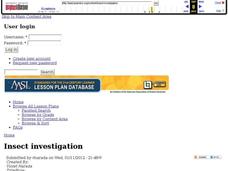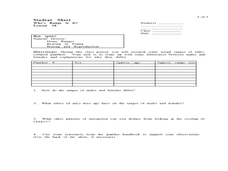Curated OER
Why I Like _____?
Explore persuasive writing with your middle schoolers. They each choose a place they would like to visit in the United States and do research to determine its features and attractions. Is it worthy of visiting? Using their persuasive...
Curated OER
Study of Animals
Third graders use the internet to research about an animal. After watching a demonstration, they follow the same steps to gain access to the internet as their teacher and find a picture of their animal to print. They complete a worksheet...
Curated OER
Social Studies: Improving Academic Skills
Third graders play a variation of Bingo to reinforce study skills, time management, and test taking strategies. As the teacher draws key words, they offer brief explanations or descriptions about how the words can be used. As key words...
Curated OER
Classroom Critters Developing Our Writing Skills
Students investigate animals and how it adapts to its environment. They write notes and gather information on a chosen animal. After research is completed, students create a report about the animal's characteristics, appearance, food,...
Curated OER
My Personal Wellness
Merge technology and wellness. Class members complete inquiry-based research on a personal wellness issue and create an annotated bibliography, uploading their completed work to their personal wellness websites. Prior to beginning, your...
Curated OER
Insect Investigation
Investigation is a brilliant way to spark scientific inquiry. First graders will identify, research, and report what they have learned about a mysterious bug found on the playground. They will use multimedia resources for research and...
Curated OER
Who's Range is it?
Students investigate the habits of panthers by analyzing radio transmitted data. In this animal life lesson plan, students utilize computers to view the range of different statistics dealing with Florida panthers. Students...
Curated OER
Cooperative Learning Units
Groups of learners work cooperatively to perform research, and compile a presentation for the class on a selected Nevada Indian Tribes. Some of the topics researched are territorial movements, religion, social life, recreation, and food...
Signing Time Foundation
What is the Water Cycle?
Dive into an exploration of the water cycle cycle with this simple earth science lesson. After first discussing where rain comes from, young scientists define the terms condensation, evaporation, transpiration,...
Literacy Design Collaborative
Existentialism and Kafka
Scholars read Kafka's The Metamorphosis and research for essays and articles on existentialism. After gaining information and evidence from their research, pupils write essays defining existentialism and its relationship on the work...
Teacher Printables
My Flip Book About . . .
Print these as two-sided handouts from which elementary entomologists can make a flip-style book about beetles (or a variety of other animals that are available as well). They research the habitat, food, and other interesting information...
It's About Time
Photosynthesis, Respiration, and the Carbon Cycle
Provide your class with the opportunity to view our carbon cycle close up. Young scientists research the cycle of oxygen as it completes the tasks of photosynthesis and respiration. They explore the importance of carbon in an ecosystem...
Safe Drinking Water Foundation
To Filter or Not to Filter
Drinking clean water can be taken for granted. Explore the process and high cost of filtering water with a water pollution and filtration activity. Young scientist build a filtration system to filter polluted water, examine the economics...
iCivics
Mini Lesson: Supreme Court Opinions
The court of last resort. Historians research, using current cases and issues, the impact the Supreme Court of the United States has on how our nation operates. They analyze recent decisions made by the nine judges and determine how the...
Teacher Created Resources
Angelina and Sarah Grimke: Sisters of Social Reform
Who are the Grimke sisters? Scholars find out with a worksheet that details the struggles and triumphs of the lives of Angelina and Sarah Grimke. After reading an informational text, class members have the opportunity to show what they...
Virginia Department of Education
Thermochemistry: Heat and Chemical Changes
What makes particles attract? Here, learners engage in multiple activities that fully describe colligative properties and allow the ability to critically assess the importance of these properties in daily life. Young chemists...
Curated OER
Aerogel
Students identify how technology aids scientists in their research. Through discussion, they explain the various ways scientists use Aerogel to aid in their collection of high-speed particles. Through experimentation, students create...
iCivics
Drafting Board: Military Intervention
Should countries use their militaries to stop humanitarian crises in other countries? Learners make claims, organize their reasoning, and provide evidence for their arguments with this rich resource.
Drexel University
Learning Roomba Module 1: Robotics Introduction
Introducing Mr. Robot. As an introduction to robotics, class develop a definition of a robot and make distinctions between real robots and those in science fiction. They also study the basics of programming in Java to...
Howard Hughes Medical Institute
Central Dogma and Genetic Medicine
Scientists work every day to find solutions to genetic diseases. Scholars learn about the process of gene sequencing, mutations, and the results. They explore genetic diseases and therapies to intervene and help and, through case...
Academy of American Poets
Teach This Poem: “Making History” by Marilyn Nelson
What makes an event newsworthy, worth a reference in a news magazine or textbook? Who decides? These are questions Marilyn Nelson asks readers of her poem "Making History" to consider. To begin, class members list details they notice in...
Howard Hughes Medical Institute
Gorongosa: Making Observations Activity
Do you have young scientists wanting to make new discoveries rather than just completing the same experiments? Young scientists use their observational skills to identify animals and patterns in animal behavior. Through tracking...
American Psychological Association
A Tasty Sample(r): Teaching about Sampling Using M&M’s
Here's a sweet activity! As part of a study of psychological research methods and statistic gathering, individuals develop a hypothesis about the number of each color of M&Ms in a fun-size package. They then count the number of each...
Curated OER
Beyond the Dictionary: Meaningful Word Study
Engaging lesson and activity ideas that grow pupils' word knowledge in all content areas.

























